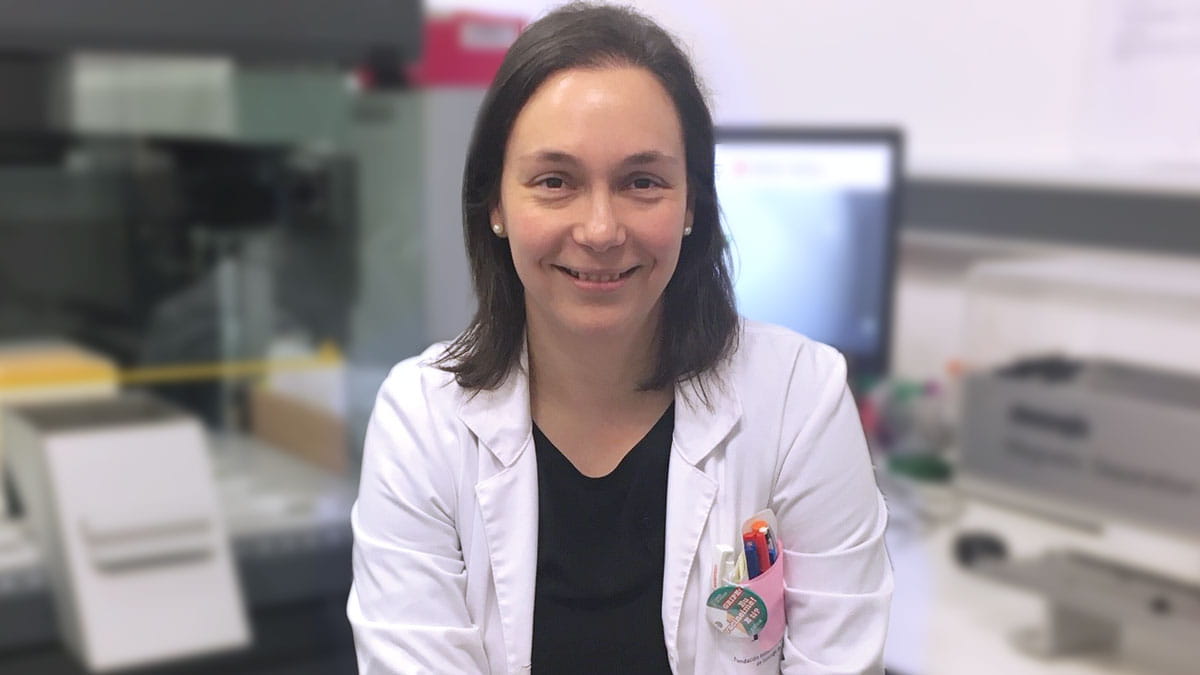
Ceres Fernandez Rozadilla is a Principal Investigator of the Genomic Medicine Group (GMX) of the Institute of Biomedical Research of Santiago (IDIS). Additionally, she serves as the coordinator for Marie Skłodowska-Curie Actions (MSCA) Doctoral Networks (DN) 2021 ColoMARK, a doctoral network providing comprehensive training to up-and-coming scientists with a focus on identifying and developing novel colorectal cancer biomarkers using liquid biopsy approaches.
Cancer research is important to me because …
As a disease related to longer life expectancy, cancer incidence has evolved so much over the last 100 years. Hence, it is our duty to make understanding cancer, how it arises, and how it can be treated of utmost priority so we can live longer with a good quality of life.
The person who inspired me most in my career was …
As a female researcher in Spain, it is probably not rare to say that Margarita Salas was my role model scientist growing up. She was a force-of-nature female researcher in a time when women and their contributions to science were hardly visible or recognized. Her groundbreaking work in basic science facilitated the boom of genomics in later years. I had the honor of meeting her a few years ago and was utterly in awe of her work capacity and genuine love for science.
If I were starting my career again …
I would visit as many other labs as possible. As scientists, our work is highly collaborative, which is fantastic. But this collaboration usually happens remotely. When I participated in a scientific stay program, I found visiting other labs and seeing how they are organized and work enriching. This experience opens you up to a stream of ideas and new perspectives that you can incorporate into your research. Also, I would learn about transdisciplinary scientific skills earlier than I did.
The happiest moment in my scientific career was …
Becoming a Principal Investigator. The path toward this career milestone is challenging and comes with self-doubt about whether you are good enough in this ever-evolving field. You may ask yourself, “Is my research interesting or innovative enough?” “Is it useful?” Becoming a Principal Investigator gave me the validation that I was indeed good enough. Also, being a Principal Investigator gives you the freedom to develop and pursue your ideas, which is one of the most exciting parts of science. It comes with a massive load of responsibility, though.
The most important publication in cancer research is …
Given my field bias, the publishing of James Watson´s sequenced whole genome in Nature in 2008. This publication was pivotal as it made us see and appreciate the potential of next-generation sequencing (NGS) and birthed the omics era.
The most important research breakthrough is …
My work focuses on genetic predisposition to cancer, particularly colorectal tumors. For the past 15 years, I and others have been trying to understand how these tumors develop and how our genes are involved in this development. Lately, we have been integrating different molecular levels of omics data, which has allowed us to identify more genetic factors and envisage how they work at the cellular level. These findings have significant implications in population-wide screening and the development of chemoprevention, both of which could significantly reduce colorectal cancer incidence.
The most important advancement in cancer research that must happen in the next five years is …
Prevention. Cancer prevention is crucial in reducing the cancer burden. As regards therapy, I would like to see advances in individualized treatment strategies beyond the few available, like molecular-matched therapies. I also have high hopes for chimeric antigen receptor (CAR)-T-cell therapy for solid tumors and tumor vaccines.
Societies should change over the next 10 years to help control and prevent cancer by …
The scientific community should put more effort into communicating information clearly and relevantly, as doing so could positively impact cancer prevention.
I would recommend to young scientists …
To keep a good work-life balance. Research is arduous but also extremely rewarding. As it’s also a job for most of us, we can get emotionally high at the prospect of finding something new and exciting. However, often, exciting discoveries come at the expense of dedicating a good part of our lives to science. Working this way for a defined objective and a limited period is okay. Still, if it continues indefinitely, it can lead to burnout, which is counterproductive to our goal as scientists. Sometimes spending more time on a project doesn’t necessarily yield better results; taking breaks and getting involved in unrelated activities has driven me to the solutions I was pursuing. Apply this principle to everyday life. Work when you need to and feel productive, then decompress.
I want to be remembered for …
Ideally, as someone who was dedicated to something she loved and contributed to improving our chances of defeating cancer.
If you enjoyed reading this blog, take a look at our “Stars of Cancer Research” series on our cancer research pages.
